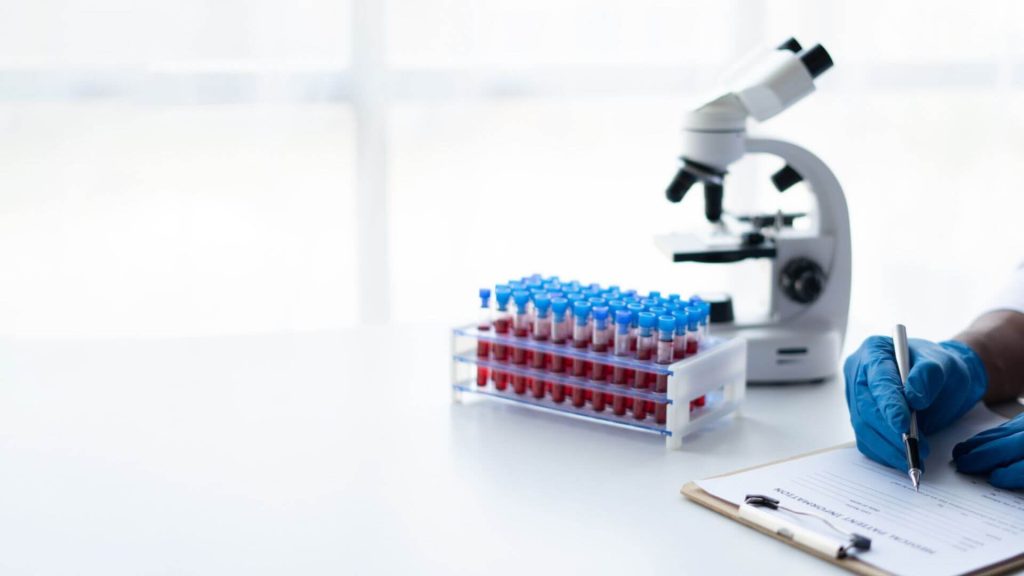The DNA Company and Genetic Risk Scores
Interested to work with Dr. Rademaker?
The Impact of Computational Biology on Genetics
Computational biology has revolutionized genetics. In 1993, the Human Genome Project was initiated to use the fully-sequenced genome as a benchmark for comparing different groups. For instance, a group of individuals with Alzheimer’s disease will have different gene versions, referred to as “SNPs” (Small Nucleotide Polymorphisms). This means that in their unique DNA, one of the four DNA molecules (A, T, C, G) differs in that specific location. With millions of these variations across each person’s genome, it sets each human apart from others. These minor differences accumulate and affect how DNA and cells function. However, in the case of the Alzheimer’s group, comparing their DNA to a group without the disease aims to identify the regions in their DNA that contribute to the disease’s development, as it is unlikely that the non-Alzheimer’s group will have them.
The Role of GWAS Studies & Personal Wellness Companies
Scientists use powerful computational systems to conduct GWAS (Genome Wide Association Studies) that compare and test genetic data. These studies have helped develop numerous cures for various diseases. Personal wellness companies like The DNA Company apply the findings from these studies to improve your well-being. By analyzing your genetic data, they can determine if you are predisposed to certain diseases, conditions, or other characteristics. For example, suppose you have a specific version of the LPL gene that leads to less lipase production. In that case, it may be beneficial to reduce your fat intake to improve digestion and energy levels while minimizing discomfort.
Limitations and the Future of DNA Testing

The above mentioned tests aren’t perfect. We still haven’t been able to verify the functional workings of close to 99% of GWAS findings. Just because a SNP is associated with a disease doesn’t mean we know how it impacts the disease. The computers can tell us there’s a risk involved, but it’s up to scientists doing cellular and animal work to figure out exactly how they play a role and what they’re doing mechanistically. In addition, epigenetic factors, post-transcriptional, post-translational, and other genome regulation factors can play a role in determining outcomes. Perhaps, also, the biggest issue with polygenic risk scores (which is the likelihood of you developing a particular condition) is that they don’t account for protective genetic factors. When targeted, upregulated, or introduced into a patient’s physiology, these protective genetic factors have a drastically higher success rate in clinical trials (1).

DNA testing can offer valuable information about your basic physiology, helping you determine the most suitable diet and exercise routine for your body. It can also identify genetic mutations that increase the risk of serious illnesses, enabling early interventions. However, there is still much that we still need to learn about genetics and how environmental factors affect them, so DNA testing still needs to be completely accurate. As a geneticist, I am aware of this limitation. Participating in DNA testing can still be beneficial, especially with companies that protect your data from potential buyers. By providing scientists with more data, better models can be developed to help us better understand genetics. Although medically predictive tests are still decades away, certain DNA testing companies can help you make positive changes to your daily wellness routine. While it is impossible to maintain perfect wellness, The DNA Company’s test can help you focus on the areas that will make the most significant difference for your individual needs.
Frequently Asked Questions
What is Genomic Testing, and How Does it Differ from Genetic Testing?
The term “genomic testing” refers to the process of examining an individual’s entire genome – including both their genes and non-coding DNA – to identify any variations, mutations, or other genetic characteristics. In contrast, “genetic testing” usually focuses on specific genes or markers associated with certain conditions or traits. Overall, genomic testing provides a more comprehensive understanding of an individual’s genetic makeup.
What are the Main Purposes of Genomic Testing?
The main purposes of genomic testing includes assessing disease risk, providing personalized medicine, revealing ancestry and genealogy, predicting how individuals may respond to specific drugs, and advancing research in genetics and related fields. This type of testing can identify genetic predispositions to various diseases, enabling early intervention or preventive measures. Genomic data can also help tailor medical treatments, medications, and therapies to an individual’s genetic profile for better outcomes. Furthermore, it can provide insights into one’s ancestral origins and family connections. Additionally, pharmacogenomics can predict how an individual may respond to specific drugs, helping healthcare providers choose the best medications. Lastly, genomic data contributes to ongoing research in genetics, genomics, and related fields, advancing our understanding of human biology.
Can Genomic Testing Predict All Diseases and Health Conditions?
No. Although genomic testing can reveal an individual’s genetic predisposition to certain diseases, it is not a foolproof predictor of all health conditions. While it can pinpoint genetic risk factors for conditions with a strong genetic component, like certain types of cancer and inherited disorders, many health issues are influenced by a combination of genetic, environmental, and lifestyle factors. Genomic testing is undoubtedly insightful, but it alone does not comprehensively assess one’s overall health and well-being. It is essential to supplement genomic information with routine medical check-ups and a healthy lifestyle for a holistic approach to health.
Renowned Medical Coach

As we contemplate the question, “Can genomic DNA testing change your life?” The resounding answer is “Yes.” The power of genomics lies not only in its ability to identify genetic predispositions to diseases but also in its capacity to guide us toward tailored solutions that can enhance our lives.
A renowned medical coach, Dr. Bart Rademaker’s commitment to wellness, integrated energy healing, stem cell therapy advocacy, and belief in medicine underscores the profound impact a holistic approach to health can have on our lives. Moreover, his dedication to empowering physicians highlights the importance of collaboration and knowledge sharing in this ever-evolving field.
As we move forward, let us embrace the potential of genomic DNA testing as a beacon of hope for healthier lives. Let us recognize the pioneering spirit of individuals like Dr. Rademaker, who lead the way toward a future where wellness is not just a concept but a tangible reality for all.
- Dr. Bart Rademaker
- 813-884-0160
- [email protected]
- 334 East Lake Road Palm Harbor, Florida 34685

